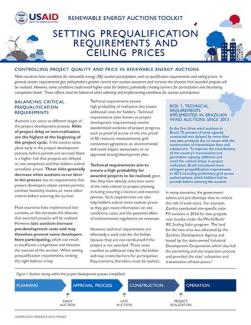Policymakers must carefully select and balance conditions, such as qualification requirements and ceiling prices, that bidders must comply with to participate in a renewable energy auction.
Policymakers have many objectives for auctions such as promoting private sector investment and socioeconomic progress. Adapting the auction design to local framework conditions and priorities is one of the key steps to ensure success in achieving auction policy objectives. Good auction design can enable policymakers to advance many objectives, including reaching renewable energy targets, lowering generation costs, supporting the integration of renewable energy, and creating local jobs. Good auction design also mitigates risks to all parties and reduces the chance of project construction delays, non-completion, and underperformance during the operation phase.
To control for project quality and price in the auction, most countries have implemented conditions for participation, such as prequalification requirements and ceiling prices that bidders need to comply with when taking part in the renewable energy auction. In general, stricter requirements allow governments to assume greater control over auction outcomes and to increase the chances that awarded projects will be realized. However, some of these conditions for participation entail higher costs for bidders. They might also create barriers for the participation of some actors and decrease overall competition levels in the auction. These effects need to be balanced when selecting conditions for participation.



